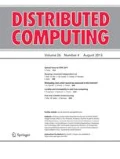Summary
Distributed Mutual Exclusion algorithms have been mainly compared using the number of messages exchanged per critical section execution. In such algorithms, no attention has been paid to the serialization order of the requests. Indeed, they adopt FCFS discipline. Conversely, the insertion of priority serialization disciplines, such as Short-Job-First, Head-Of-Line, Shortest-Remaining-Job-First etc., can be useful in many applications to optimize some performance indices. However, such priority disciplines are prone to starvation. The goal of this paper is to investigate and evaluate the impact of the insertion of a priority discipline in Maekawa-type algorithms. Priority serialization disciplines will be inserted by means of agated batch mechanism which avoids starvation. In a distributed algorithm, such a mechanism needs synchronizations among the processes. In order to highlight the usefulness of the priority based serialization discipline, we show how it can be used to improve theaverage response time compared to the FCFS discipline. The gated batch approach exhibits other advantages: algorithms are inherently deadlock-free and messages do not need to piggyback timestamps. We also show that, under heavy demand, algorithms using gated batch exchange less messages than Maekawa-type algorithms per critical section excution.
Similar content being viewed by others
References
Agrawal D, Abbadi AE: An efficient and fault-tolerant solution for distributed mutual exclusion. ACM Trans Comput Syst 9(1): 1–20 (1991)
Baldoni R: AnO(N M/(M+1) distributed algorithm for thek-out of-M resources allocation problem. In: Proc of 14-th Int Conf on Distributed Computing Systems. IEEE Press 1994, pp 81–87
Baldoni R: Mutual exclusion in distributed systems. Ph.D dissertation, Dipartimento di Informatica e Sistemistica, University of Rome “La Sapienza”, Italy, 1994
Baldoni R, Ciciani B: Distributed algorithms for multiple entries to a critical section with priority. Inf Process Lett 50(3): 165–172 (1994)
De Vries RC: Reducing NULL messages in Misra's distributed discrete event simulation method. IEEE Trans Soft Eng 16(1): 97–107 (1990)
Fidge CJ: Logical time in distributed computing systems. IEEE Comput 24(8) 28–33 (1991)
Kleinrock L: Queuing systems volume II: computer applications. Wiley 1976
Lamport L: Time, clocks and the ordering of events in a distributed system. Commun ACM 21(7): 558–565 (1978)
Lavenberg SS: Computer performance modeling handbook, Academic Press, New York 1983
Maekawa M: A N algorithm for mutual exclusion in decentralized system. ACM Trans Comput Syst 3(2): 145–159 (1985)
Mostefaoui A, Raynal M: Causal multicast in overlapping groups: towards a low cost approach. In: Proc of Int Conf on Future Trends of distributed Systems. IEEE Press 1993, pp 136–142
Raynal M: A simple taxonomy for distributed mutual exclusion algorithms. ACM Operat Syst Review 25(1): 47–51 (1991)
Ricart G, Agrawala AK: An optimal algorithm for mutual exclusion in computer networks. Commun ACM 24(1): 9–17 (1981)
Sanders BA: The information structure of distributed mutual exclusion algorithms. ACM Trans Comput Syst 5(3): 284–299 (1987)
Schneider FB: Synchronization in distributed programs. ACM Trans Prog Lang Syst 4(2): 179–195 (1982)
Singhal M: A class of deadlock-free Maekawa-type algorithms for mutual exclusion in distributed systems. Distrib Comput Syst 4: 131–138 (1991)
Singhal M: A taxonomy of distributed mutual exclusion. J Paralel Distrib. Comput 18: 94–101 (1993)
Takagi H: Queueing analysis volume 1: vacation and priority systems. North-Holland 1991
Author information
Authors and Affiliations
Corresponding author
Additional information
Roberto Baldoni was born in Rome on February 1, 1965. He received the Laurea degree in electronic engineering in 1990 from the University of Rome “La Sapienza” and the Ph.D. degree in Computer Science from the University of Rome “La Sapienza” in 1994. Currently, he is a researcher in computer science at IRISA, Rennes (France). His research interests include operating systems, distributed algorithms, network protocols and real-time multimedia applications.
Bruno Ciciani received the Laurea degree in electronic engineering in 1980 from the University of Rome “La Sapienza”. From 1983 to 1991 he has been a researcher at the University of Rome “Tor Vergata”. He is currently full professor in Computer Science at the University of Rome “La Sapienza”. His research activities include distributed computer systems, fault-tolerant computing, languages for parallel processing, and computer system performance and reliability evaluation. He has published in IEEE Trans. on Computers, IEEE Trans. on Knowledge and Data Engineering, IEEE Trans. on Software Engineering and IEEE Trans. on Reliability. He is the author of a book titled “Manufactoring Yield Evaluation of VLSI/WSI Systems” to be published by IEEE Computer Society Press.
This research was supported in part by the Consiglio Nazionale delle Ricerche under grant 93.02294.CT12
This author is also supported by a grant of the Human Capital and Mobility project of the European Community under contract No. 3702 “CABERNET”
Rights and permissions
About this article
Cite this article
Baldoni, R., Ciciani, B. A class of high performance Maekawa-type algorithms for distributed systems under heavy demand. Distrib Comput 8, 171–180 (1995). https://doi.org/10.1007/BF02242735
Received:
Accepted:
Issue Date:
DOI: https://doi.org/10.1007/BF02242735




